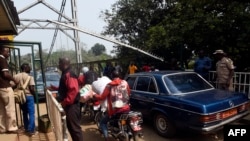Governors from Cameroon and Nigeria plan to re-open markets and rebuild schools along their shared border after declaring the area free of Boko Haram militants.
Babagana Umara Zulum, governor of Nigeria’s Borno state, said President Muhammadu Buhari instructed governors of border states affected by Boko Haram to work with neighboring countries to improve living conditions.
He said governors from Cameroon and Nigeria will reopen border markets and rebuild schools in towns and villages where Boko Haram has been defeated.
"We are doing everything possible to ensure that the Banki market is reestablished," Babagana said. "The bringing of cattle from the Republic of Chad to Cameroon, to Nigeria had stopped. My humble self and the governor will go and reopen the cattle route from Gamboru-Ngala. It will improve the economy of Nigeria and improve the economy of Cameroon. By September, we shall be going to Chad and Niger to see how we can improve on our bilateral relationships."
Babagana spoke by a messaging app from Maiduguri, capital of Nigeria's Borno state on Thursday after meeting a delegation led by Midjiyawa Bakari, governor of Cameroon's Far North Region.
He said the Gamboru-Ngala cattle market, which is the largest in northeast Nigeria, was shut down in May 2014 after Boko Haram fighters massacred 300 civilians and abducted 200 people. The market is near Nigeria's border with Cameroon.
Bakari, who is also chairman of the Lake Chad Basin Governors Forum, says he was asked by Cameroon’s president, Paul Biya, to visit border localities where Boko Haram has been eliminated.
Bakari said President Biya dispatched his minister of public works to make sure that border roads in areas where Boko Haram has been defeated are repaired to boost cross border trade. He said the Banki market is among several dozen near the Cameroon-Nigeria border that want to collectively reopen.
Bakari said the border markets and schools that were destroyed by Boko Haram will be reopened before December.
He said he had fruitful meetings this week in Nigeria with the governor of Yobe and Borno states. Both states say Boko Haram attacks have been greatly reduced and people can resume their activities.
Cameroon says peace has also returned to a majority of its northern border with Nigeria.
In June the Multinational Joint Task Force of the Lake Chad Basin Commission said its troops from Nigeria, Niger, Cameroon and Chad killed more than 800 jihadis in about two months of fighting on the Cameroon-Nigeria border.
The task force was constituted in 2015 to fight Boko Haram and its rival, the Islamic State in West Africa Province (ISWAP).
Cameroon and Nigeria say there is an increase in the number of Boko Haram militants surrendering at disarmament centers since May of 2021 when Abubakar Shekau, leader of the Islamist group, was declared killed.
Last week, President Buhari visited Borno state, the former epicenter of Nigeria's Islamist insurgency, and formally opened 500 units of newly built resettlement houses for people internally displaced by the 13-year Boko Haram conflict.
The United Nations says more than 37,000 people have been killed and about 2.8 million people displaced by the Boko Haram uprising that began in 2009.
